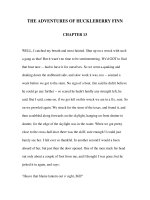Grammar sense 1 - from chapter 13 to 15 pdf
Bạn đang xem bản rút gọn của tài liệu. Xem và tải ngay bản đầy đủ của tài liệu tại đây (53.92 KB, 3 trang )
CHAPTER 13 and CHAPTER 14
THE FUTURE WITH Be Going To, WILL, and The present Continuous
Affirmative : S + is / are / am + going to + V (bare infinitive) + O
S + will + V (bare infinitive) + O
Negative: S + isn’t / aren’t / am not + going to + V + O
S + will not (won’t) + V + O
Yes / No: Is / Are / Am + S + going to + V + O?
Will + S + V + O?
Be going to and the Present Continuous as FUTURE :
A. INTENTIONS AND PLANS : Use BE GOING TO and THE PRESENT CONTINUOUS to talk
about intentions or future plans.
For example: 1. I’m going to study hard for the test. (= I am studying hard for the test.)
2. She’s going to visit Greece this summer. (= She’s visiting Greece this
summer.)
B. The present continuous often refers to MORE definite plans than BE GOING TO. With BE
GOING TO, the speaker often has not decided on the details.
For example:
Present Continuous as FUTURE (Details Definite)
I’m taking a 3:00 flight to Chicago. In Chicago, I’m changing planes and flying on to Miami.
Be Going to (Details NOT definite)
A: I’m going to buy a car.
B: What kind are you going to get?
A: I don’t know yet.
C. Use BE GOING TO for predictions (guesses about the future), especially when there is
evidence that something is just about to happen. The present continuous is NOT used to
make predictions.
For example: 1. Be careful! That glass is going to fall!
2. It’s cloudy. I think it’s going to rain tonight.
THE FUTURE with WILL and BE GOING TO:
A. Predictions with WILL and BE GOING TO
+ Use WILL or BE GOING TO to make predictions. You can also use PROBABLY and other
adverbs with WILL and BE GOING TO to express certainty or uncertainty.
1. Electric cars will become (are going to become) popular in the next ten years.
2. They’ll probably win (are probably going to win) the championship.
+ With predictions, use BE GOING TO when you are more certain that an event will happen
because there is evidence. Do NOT use WILL when there is evidence to make predictions.
For example: She’s going to have a baby! (She’ll have a baby – INCORRECT)
B. Quick Decisions vs. Advance Plans
WILL is often used to express a quick decision made at the time of speaking (such as an offer
to help). BE GOING TO shows that you have thought about something in advance. Do not use
BE GOING TO for quick decisions.
WILL for Quick Decisions
A: I don’t have a fork.
B: I’ll ask the waiter to bring you one
BE GOING TO for Advance Plans
A: Do we have plastic forks for the party?
B: No. I’m going to ask Lisa to bring some.
C. Promises with WILL: In statements with I or WE, WILL is often used to express a
promise.
A: Chris, please clean your room.
B: I’ll do it later, Mom. I promise.
CHAPTER 15:
MAY and MIGHT for Present and Future Possibility
• PRESENT AND FUTURE POSSIBILITY: MIGHT and MAY
+ MIGHT, MAY express possibility about the future or present possibility. MIGHT sometimes
express more uncertainty than MAY.
For example:
1. I may take history next semester. It seems like a good idea.
2. A: Who’s that man? B: He might be Dana’s father.
+ MIGHT/MAY (NOT) + BE ABLE TO talks about future possibility and future ability.
For example: 1. It’s already April, but I might be able to go skiing one more time.
2. If I learn to speak Portuguese, I may be able to get a job in Brazil.
+ Use MAY or MIGHT when something is possible but not certain. If you are certain about the
present, use the simple present or the present continuous. If you are certain about the future,
use WILL or BE GOING TO.
For example:
Possible but Not Certain:
A: Where’s Emily?
B: I don’t know. She might be upstairs.
A: We need to be in class by 9:00.
B: The bus might not be on time. It’s often late.
Certain:
A: Where’s Robin?
B: She’s in the kitchen. I just saw her.
A: We need to be in the city by 8:00.
B: The train will be on time. It’s never late.
+ Use WILL in YES/NO questions about future possibility. You can use MIGHT but it will
sound overly formal. Do not use MAY.
For example: 1. Will he come home soon?
2. Might he come home soon? (* May he come home soon? – INCORRECT)
+ Use WILL when you are certain about something. If you are not certain, you can weaken
WILL by adding the adverbs PROBABLY, MAYBE, and PERHAPS.
Certain Not certain
They’ll move in the summer. They’ll probably move in the summer.
She’ll find a new job. Maybe / Perhaps she’ll find a new job.









